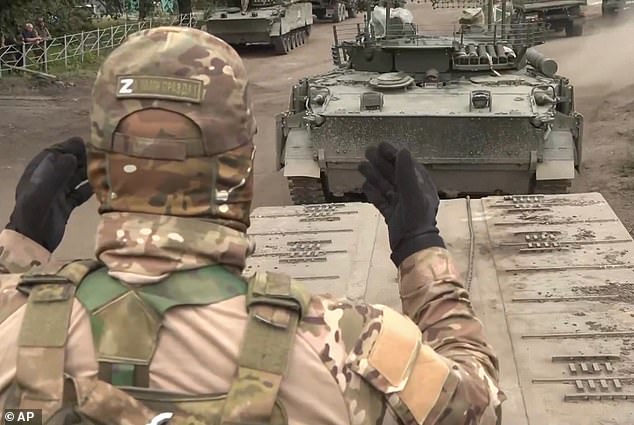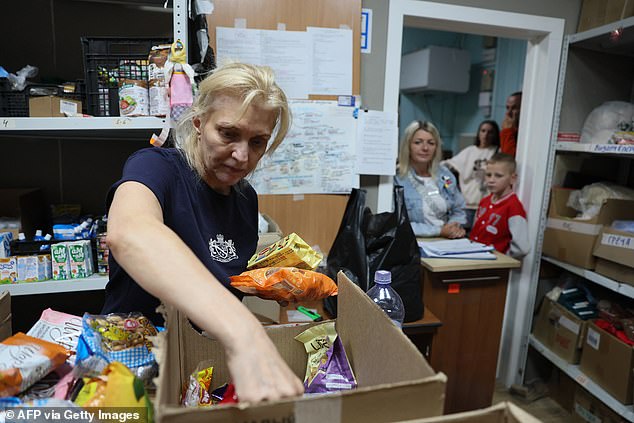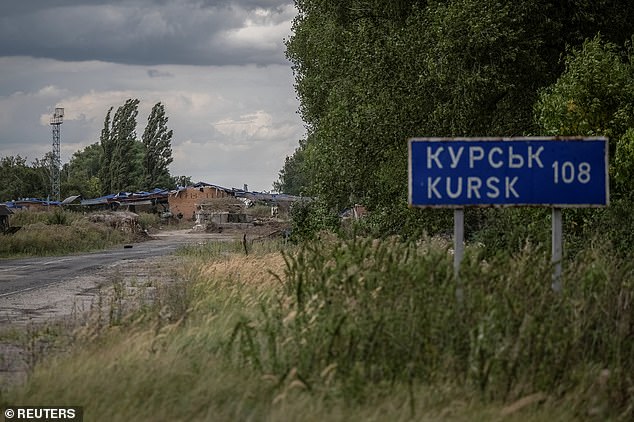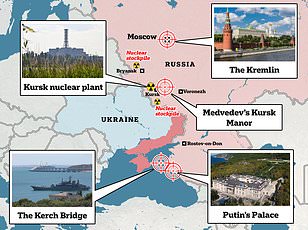Who will feel Putin's wrath for Ukrainian humiliation? Blame game heats up, with military general, border guard chief and Chechen warlord Kadyrov's close ally among those at risk of punishment
The blame game in Russia is heating up after Ukraine humiliated Vladimir Putin and his forces by taking control of more land in a week than Russian invaders have in the last eight months.
Putin is reportedly 'seething' over the Ukrainian breakthrough into Russian territory in the Kursk and Belgorod regions, which saw 200,000 Russians evacuate their homes, and said his army needed to 'push and drive the enemy out of our territories.'
Questions have been raised over Russia's lack of preparedness for a counter-incursion by Ukraine, with Russian lawmaker Andrei Gurulev writing on Telegram that it is 'impossible' that the Russian government had no knowledge of Kyiv's plans.
But Gurulev, who is a member of Putin's United Russia party, is not the only one pointing fingers - and senior members of Putin's administration could soon find themselves on the chopping block for not preventing or at least halting the invasion.
MailOnline looks at the top generals, regional officials and shady border guard chiefs among those now most at risk of punishment.

Putin is said to be 'seething' over the Ukrainian incursion - and heads may still roll

Putin meets security officials and regional governors to discuss the dire situation


Ukrainian servicemen operate a Soviet-made T-72 tank in the Sumy region, near the border with Russia, on August 12, 2024, amid the Russian invasion of Ukraine
Valery Gerasimov - Chief of the General Staff of the Russian Armed Forces
Valery Gerasimov allegedly received intelligence of an Ukrainian invasion of Russia before it happened and failed to act on it, before announcing 48 hours after Ukrainian troops attacked that the invasion had been stopped in its tracks - but in reality Ukraine kept seizing territory.
Furious Russians living near the border town of Sudzha made a video appeal to Putin last week angrily attacking Gerasimov for 'lying' in claiming that the Ukrainian advance had been halted.
'Foreign troops with NATO equipment entered our land,' they complained, upset that they are facing the same foreign occupation that Putin has inflicted on large regions of Ukraine.
'Recently, the Chief of General Staff [General Valery Gerasimov] told you that the situation is under control. This is a lie. This lie allows civilians to die,' a woman in the group said.
His alleged failure to act on intelligence of the invasion and apparent lie about it being stopped could possibly see Gerasimov being demoted in the near future.
Putin has already handed the responsibility of tackling the invasion over to FSB chief Alexander Bortnikov, which could be a sign of Gerasimov being in Putin's bad graces.

Valery Gerasimov reportedly received intel about Ukrainian troops amassing on the border

A Ukrainian serviceman drives a self-propelled howitzer 2S1 Gvozdika into Kursk, August 13, 2024

Belarus moves military equipment to Russia amid the ongoing offensive in Kursk
Sergey Kuzovlev - Colonel General, in charge of the military district Ukraine invaded
The Kursk region falls into the Moscow military district (MMD) overseen by Colonel General Sergey Kuzovlev.
While Kuzulev was in charge of the Russian troops in the area Ukraine invaded, most of his soldiers are currently engaged in Ukraine.
Nevertheless, Kuzovlev will have to bear some responsibility for the few troops left in Kursk being unable to defend their Russian territory against Ukraine.
In Kursk, the defenders appeared to be 'conscripts and irregular forces', largely caught off guard, the Washington-based Institute for the Study of War assessed days into the incursion.
'The lack of a coherent Russian response to the Ukrainian incursion into Kursk... and the reported rate of Ukrainian advance indicates that Ukrainian forces were able to achieve operational surprise.'
The Moscow Times tentatively posited today, under an anonymous byline, that the use of inexperienced conscripts 'raises questions' about their preparedness.
Russia now faces the dilemma of how it responds, pressed to draw veteran troops away from fragile frontlines in Ukraine, or throw more inexperienced soldiers at Kursk and Belgorod.
Russian sources have claimed the broken lines might be being filled with irregular units from Donetsk Oblast - a move that continues to undermine confidence in Kuzovlev the longer it goes on.
The coming months will show whether this will come in form of a demotion, or whether he might meet the same fate as other top Russian commanders like Sergey Surovikin and Gennady Zhidko that were shuffled off to obscurity since the war started.

Kuzolev was in charge of troops in the region when Ukraine invaded, damaging his credibility

Evacuated people queue to fill out the form for humanitarian aid at a distribution centre in Kursk on Wednesday
Vladimir Kulishov - Head of the FSB Border Guard Service
Vladimir Kulishov, the head of Russia's FSB Border Guard Service, has remained an elusive figure throughout the war so far.
One notable mention came in May of this year, when he claimed NATO was training for a nuclear strike on Russia as tensions erupted over the Russian reopening of its front in Kharkiv.
In an interview with Russian news agency RIA Novosti at the time, he boasted that Russian border forces were well bolstered and more resources had been thrown at the frontiers to fend off potential invasions.
Now, questions arise as to whether the seasoned general will take the fall for Ukraine's lightning offensive.
As the name suggests, the FSB - the main successor to the KGB - Border Guard Service is supposed to be in charge of frontier defence.
But during the initial assault into Kursk, many officers of the Border Guard simply 'vanished', a senior western diplomat told New Lines Magazine.
'Many just laid down their arms and fled,' he told the magazine.
Kursk was identified as a Russian weak spot and plans for the operation revealed to Ukrainian leaders only three days in advance.
No clear effort had been made to reinforce the region with mines or fortifications, as seen on the so-called Surovikin line of tanks, trenches and underground bases used to thwart Ukraine's counter-offensive last year.
Of particular humiliation, Kursk was famously the site of a major tank battle in World War II, in which the USSR - staffing many millions of Ukrainian troops at the time - dug tanks into the ground to see off the encroaching Nazis.
The Germans brought nearly 800,000 troops and nearly 3,000 tanks, plus artillery, to Kursk in 1943 before being turned away in their last strategic offensive in the east of the war.
That Kursk should be lost in a matter of days to an initial force of some 1,000 troops and a handful of armoured vehicles will be particularly embarassing to the Border Guard Service.

Kulishov's Border Guard is likely to shoulder some of the blame for not preventing the assault

A Ukrainian soldier stands guard as he surveys a line of Russian POWs taken in Kursk

Ukrainian servicemen drive an armoured military vehicle past a destroyed border crossing point with Russia on Wednesday
Viktor Zolotov - Director of the Rosgvardia
While the FSB Border Guard is responsible for the security of all of Russia's legal borders, territorial defence comes under the remit of the Rosgvardia.
Zolotov and other higher-ups in the Russian national guard can be expected to shoulder some of the responsibility for Ukraine's foray.
Scholars have commended Ukraine's armed forces for being able to expose the vulnerability in this ambiguous space to their own advantage.
'This AFU (Armed Forces of Ukraine) operation has successfully exploited seams of responsibility between the FSB (Federal Security Service), Rosgvardia (National Guard) and MoD (Ministry of Defence),' Dara Massicot, a Russian defence scholar at the Carnegie Endowment for International Peace, told the Telegraph.
'I suspect targeted leaks will emerge between the MoD/GRU (General Staff of the Armed Forces of the Russian Federation) and the FSB over who is responsible for intel and defence failures,' she added.
The ISW came to similar conclusions, writing that the 'disorganised nature of regular Russian battalions... as well as the integration of conscripts, FSB personnel, and Rosgvardia elements in combat, will hinder the Russian effort to establish effective command and control' of personnel.
Zolotov listened quietly as Putin addressed a room of officials on Monday about the situation, inviting regional leaders to discuss their respective needs and challenges.
For now, the Rosgvardia will work with the FSB and the military on its 'counter-terrorist operation', trying to turn the tide.
The national guard is also working desperately to secure and protect the Kursk nuclear power plant.
How it responds to the challenges ahead may come to determine the fate of the FSB and Rosgvardia, and their future responsibilities.

Viktor Zolotov of the National Guard met with Putin on August 12 to discuss the situation

Russian military vehicle boarding a lowboy for transfer to Kursk region on Monday

Refugees displaced by the Kursk attack receive humanitarian aid at a collection station in Moscow on August 13
Apti Alaudinov - Major-General in charge of the Chechen Akhmat special forces
Major-General Alaudinov was quick to attack his own commandeering officers of the Chechen Akhmat group after the incursion.
'The enemy was preparing for this action very seriously...' he said.
'It turned out that some of the leaders of the [Russian] Ministry of Defence, as I understand it, were so deceitful, so deceitful, and it turned out that they deceived themselves.'
Alaudinov, also a high-ranking member of the Rosgvardia, finds himself at an intersection of blame but has been entrusted with masterminding a response.
As a close ally of Chechen leader Ramzan Kadyrov, he also benefits from friends in high places.
Alaudinov has managed some of the commentary surrounding the assault so far by playing up the scale and trying to shift the blame elsewhere.
It was he who claimed Ukraine was working on a NATO playbook with British choreographers, and claimed 'we are recording that there are a lot of French, a lot of Poles [invading Russia's Kursk region]'.
He was told by Russian war correspondent Semyon Pegov: 'I see the British style, to be honest, purely their style [in the Ukrainian surge into Russian territory].'
The general - commander of Akhmat [Chechen] special forces - replied: 'In principle, you have just laid out the picture that we have.'
'Of course, it must be stated that this operation is being managed by the NATO bloc headquarters command,' he said. 'The Ukrainians themselves are unlikely to be able to formulate such a thing.'
The effort to move blame away from himself suggests Alaudinov might have concerns about how the invasion reflects on his own competence.

Russian Major-General Apti Alaudinov has tried to pin the blame on foreign meddlers

Ukrainian tank crew take a break while operating a Soviet-made T-72 tank in the Sumy region near the border on August 12

Ukraine claims its forces now control as many as 74 localities in Kursk Oblast, as of Wednesday
The latest Ukrainian offensive is qualitatively different to the counter-offensive promised last year.
Ukraine is reporting new claims at such a rate that even Russian forces, officials and propaganda-pushers are forced to concede that it has been a disaster for Moscow.
How blame is attributed is muddied by how Russia organises its border control, which it will be pressed to rethink if it can slow the Ukrainian advance.
For now, the most immediate question for Moscow is how to stop the tide, forcing those involved in Kursk's shoddy defence into new positions of responsibility.
If Russia is able to respond to its humiliating mismanagement in time, those same leaders will face very difficult questions about their competence and future in the roles.
































































































































































































































































































































